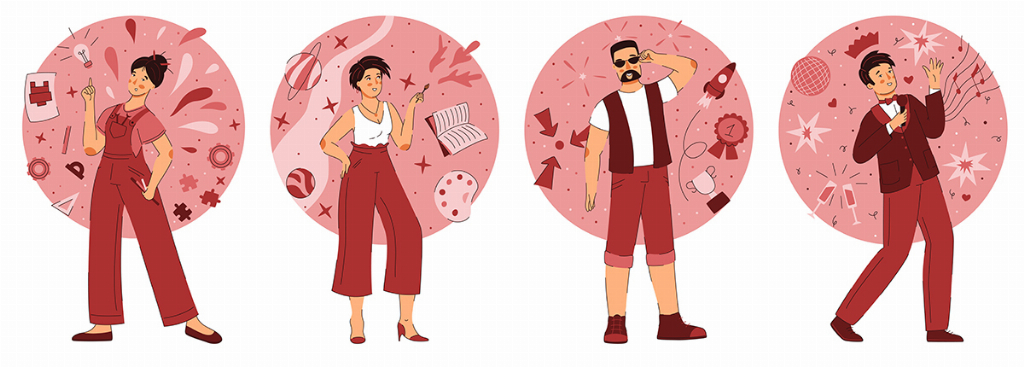Paving the Way to Career Success: Understanding Women's Personality and Career Potential through MBTI Know Yourself and Others to Resolve Workplace Conflicts

With the vast array of career choices available, have you ever wondered which profession best suits you? Each individual possesses unique personality traits, values, and working styles. Selecting a profession that aligns with one's personality not only enhances work efficiency, but also increases job satisfaction. By utilising the Myers-Briggs Type Indicator (MBTI), individuals can gain insights into their own personalities and talents, enabling them to make informed career choices. This understanding facilitates better comprehension of one's own behaviour, as well as that of colleagues and supervisors, thereby fostering effective collaboration, problem-solving, and interpersonal relationships.
MBTI, an acronym for the Myers-Briggs Type Indicator, is a personality assessment tool grounded in psychological theories. It is derived from the typological theories of psychologist Carl Jung and aims to provide deeper insights into individuals' cognitive styles and decision-making tendencies. MBTI categorises human personalities into 16 distinct types based on four dichotomous pairs: Introverted (I) vs. Extraverted (E), Sensing (S) vs. Intuition (N), Thinking (T) vs. Feeling (F), and Judging (J) vs. Prospecting (P). These personality types can be further grouped into four broader categories: Artisans (SP types), Guardians (SJ types), Idealists (NF types), and Rationalists (NT types). Each type exhibits unique behavioral patterns, career preferences and approaches to interpersonal interactions. Understanding these personality traits not only assists women in identifying suitable career paths but also enhances cooperation and communication in the workplace.

SP Types – Artisans: Adaptable and Quick Problem-Solvers
Four Personality Types: ISTP, ISFP, ESTP, ESFP
Artisans constitute approximately 30% of the population. They are known for their strong practical skills, proactive approach, and ability to respond swiftly to challenges. These individuals are typically energetic, present-focused, and enjoy adventures and new experiences, often embracing a spontaneous and flexible lifestyle.
Personality Traits:
- Optimistic, Realistic, and Focused: Possess a clear understanding of reality, demonstrating adaptability and quick decision-making abilities.
- Bold and Spontaneous: thrive on taking risks, unconstrained by minor details, and thrive in seeking excitement.
- Cheerful Partners and Creative Parents: Inspire others through actions, remain composed in crisis situations, and create a positive and innovative family environment.
- Freedom-Seeking and Skill-Oriented: Aspire to independence and excel in fields requiring hands-on expertise and tactical decision-making.
Career Preferences:
Artisans prefer dynamic and flexible work environments that demand quick thinking and immediate action. They excel in roles requiring adaptability and rapid problem-solving skills. Suitable careers include:
- ESTP : Skilled at handling crises, making them ideal for careers in sales, public relations, and business management.
- ESFP : Charismatic and expressive, excelling in entertainment, performance, and hosting roles.
- ISTP : Detail-oriented and analytical, thriving in fields such as engineering, mechanics, architecture, and data analysis.
- ISFP : Passionate about creativity, well-suited for artistic, design, and writing careers.
Workplace Tips:
When interacting with Artisans, maintain an authentic and relaxed attitude. They aspire freedom and variety in their work, requiring a degree of autonomy and flexibility. Engagement should be lively and engaging, avoiding excessive rigidity or overly structured plans. Respecting their need for spontaneity and embracing challenges alongside them will foster a more natural and enjoyable working relationship.

SJ Types – Guardians: Loyal, Reliable, and Committed to Rules and Responsibilities
Four Personality Types: ISTJ, ISFJ, ESTJ, ESFJ
Guardians comprise approximately 45% of the population, forming one of the most stabilising forces in society. They prioritise traditional values, a strong sense of responsibility, and stability, placing their commitments to family, community, and work above all else. Their loyal and dependable nature earns them the respect of others, and they prefer structured and stable environments in which to work. For them, systems and traditions serve as the foundation of stability, and they place great emphasis on responsibilities and obligations, whether in their personal or professional lives.
Personality Traits:
- Strong Sense of Responsibility and Stability: SJ types individuals are highly committed to their family, work, and social responsibilities, with an acute attention to detail.
- Respect for Tradition and Adherence to Rules: They value regulations and established systems, believing that compliance with rules fosters stability and order.
- Caring and Service-oriented: They are deeply concerned for the well-being of others and take pleasure in providing assistance and contributing to society.
Career Preferences:
Guardians thrive in structured and stable environments and excel in professions that require meticulous attention to detail and adherence to order. Their strong sense of responsibilities and abilities enable them to play key roles within teams. Suitable career choices include:
- ESTJ : Proficient in management and organisation, capable of leading teams efficiently while ensuring adherence to rules and procedures.
- ISTJ : Detail-oriented and systematic, adept at managing data and workflows to ensure smooth operations.
- ESFJ : Skilled in coordination and leadership, able to foster harmony in social settings while addressing the needs of others.
- ISFJ : Well-suited to providing support and care, particularly in professions related to healthcare, education, and social services.
Workplace Tips:
When engaging with Guardians, it is crucial to respect their emphasis on rules and responsibilities. They have a strong need for order, tradition, and stability, making it important to understand and support their lifestyle and approach to work. Building relationships with them requires sincerity and appreciation for their efforts in maintaining order. By doing so, a more harmonious interaction can be achieved, allowing them to feel comfortable in a structured and predictable environment.

NF Types - Idealists: Passionate, Sincere, and Committed to Personal Growth and Harmonious Relationships
Four Personality Types: INFJ, INFP, ENFJ, ENFP
Idealists constitute approximately 15% of the population. They focus on interpersonal relationships, personal development, and a deep concern for human potential. Women of this type are often recognised for their compassion, sincerity, and enthusiasm, seeking to explore both their own and others' inner potential. Their motivation in life is driven by the pursuit of truth, harmony, and personal ideals, with aspirations to effect positive change in the world.
Personality Traits:
- Emphasis on Interpersonal Relationships: They place great value on deep connections with others, seeking sincerity and harmony in relationships. They excel at inspiring and encouraging others to realise their inner potential.
- Empathy and Emotional Depth: Their emotions are profound and genuine, demonstrating a high level of sensitivity to the needs and feelings of others, making them understanding friends and companions.
- Idealism and Romanticism: They pursue higher meaning in life, maintain a passionate outlook towards relationships and societal development, and aspire to create a better future.
Career Preferences:
Idealists are inclined towards professions that allow them to make a positive impact on people’s lives, fostering human development and well-being. They tend to choose roles that involve motivating and guiding others, enabling them to realise their ideals and values. Suitable career paths include:
- INFJ : Well-suited to roles in psychology and counselling, as well as support services within non-profit organisations, assisting individuals in improving their quality of life.
- INFP : Skilled in creative fields such as the arts, writing, or social services, using creativity and empathy to resolve interpersonal conflicts.
- ENFJ : Demonstrate strong leadership abilities and thrive in education, corporate training, or public relations, inspiring others to reach their full potential.
- ENFP : Often drawn to creative industries, excelling in media, performing arts, or entrepreneurial ventures, where they can express their passion and innovation.
Workplace Tips:
When interacting with Idealists, sincerity is of utmost importance. They deeply value meaningful emotional connections; therefore, open and genuine communication is key to establishing a strong rapport. Avoid superficial or insincere interactions, and instead, support their ideals and aspirations while embracing their idealism and romantic outlook. Doing so fosters mutual understanding and trust, contributing to a harmonious and positive working relationship.

NT Types – Rationalists: Strategic Thinkers, Pursuing Knowledge and Efficiency
Four Personality Types: INTJ, INTP, ENTJ, ENTP
Rationalists constitute approximately 10% of the population. Their core traits include pragmatism, composure, and a focus on problem-solving and systemic analysis. Women of this personality type exhibit a strong passion for understanding and resolving complex systemic issues. Whether in the fields of technology, engineering, or societal challenges, they are adept at leveraging creativity and logical thinking. Guided by reason and analysis, they consistently seek the most effective solutions and strive to achieve optimal outcomes.
Personality Traits:
- Pragmatic and Efficient: Rationalists prioritise maximising efficiency, pursuing innovation and practical applications rather than adhering to outdated conventions. They concentrate on resolving current issues without undue regard for traditional authorities.
- Calm and Logical: Highly independent, they always remain calm and handle problems with careful consideration. NT type women are not easily influenced by external factors and remain focused on the issue at hand, making the most effective decisions based on logic.
- Strong Initiative and Determination: With a strong drive to achieve their goals, they persevere with unwavering commitment. Confident in their rational and analytical abilities, they believe that persistence and dedication will enable them to overcome challenges.
Career Preferences:
Rationalists thrive in fields that offer challenges and opportunities for innovation. Their ability to handle complexity makes them well-suited for careers in technology, management, engineering, and research. Suitable professions include:
- ENTJ : Excelling in leadership, strategic planning, and senior management roles, ENTJs possess outstanding organisational and analytical skills, allowing them to make decisive choices in various situations.
- INTJ : Skilled in long-term planning and systemic analysis, INTJs are well-suited for careers in technological innovation, research, and development, demonstrating a keen ability to navigate complex issues.
- ENTP : Highly creative and eager to challenge conventions, ENTPs flourish in entrepreneurship, technological innovation, and roles that drive new ideas and perspectives.
- INTP : Excelling in science, mathematics, research, and technology, INTPs specialise in resolving intricate theoretical problems.
Workplace Tips:
When interacting with Rationalists, it is essential to respect their logical approach and independence, as well as to understand their emphasis on deep thinking and efficiency. They prefer engaging with individuals who can partake in rational discussions and exhibit innovative thinking. Avoiding excessive emotional expressions or superficial interactions is advisable, as they prioritise logic and tangible results. Discussions should acknowledge their thought processes, and one should be prepared for in-depth and intellectually stimulating conversations. Such an approach enables NT-type women to feel understood and appreciated.
Breaking Gender Roles and Stereotypes
MBTI not only enhances our understanding of individual personality traits, but also facilitates a better grasp of workplace dynamics by recognising the preferences and working styles of different colleagues. Each individual, regardless of gender, exhibits one or more of the 16 personality types. MBTI underscores that personality, preferences, and potential are intrinsic to each person, and that gender does not determine competence or career direction. In the workplace, both men and women can harness their strengths, excel in various roles, and thrive in their respective fields. By breaking gender boundaries, individuals can unlock greater opportunities and realise their full potential.
Source: Keirsey and 16Personalities.
The information above is for reference only and aims to provide basic knowledge and share content about MBTI. If you are interested in this topic, you may refer to other related materials or opinions for a more comprehensive understanding.